Abstract
The aim of this study was to investigate the role of dispositional optimism (DO) as a predictor of health-related quality of life (HRQL) in a sample of upper aerodigestive tract cancer (UADT) patients. A prospective observational study design was used with a cohort of patients from one centre. DO was evaluated using a French version of the Life Orientation Test (the FLOT) translated and validated for this study. HRQL was evaluated using the EORTC QLQ-C30 prior to and 3 months following treatment. The association between FLOT ratings and HRQL was evaluated using linear multiple regression analysis and a two-way ANOVA with repeated measures. Baseline data were gathered on 101 subjects and follow-up data on 88 of these. The sample was dichotomized around the median FLOT score creating ‘optimist’ and ‘pessimist’ groups. Before treatment, optimists reported better role, cognitive and emotional function, less pain and fatigue and a better global rating of HRQL than did pessimists. Following treatment, optimists reported better role and cognitive functioning, less pain and better global HRQL than did pessimists. Pessimists reported a greater deterioration in the role domain following treatment than did optimists. At no point did pessimists rate HRQL better than optimists. The results suggest that optimism is associated with better HRQL in French UADT cancer patients.
Similar content being viewed by others
References
Wilson IB, Kaplan S. Clinical practice and patients' health status: How are the two related? Med Care 1995; 33(1): AS209–AS214.
Wilson IB, Cleary PD. Linking clinical variables with health-related quality of life. A conceptual model of patient outcomes. JAMA 1995; 273(1): 59–65.
Andersen BL. Surviving cancer. Cancer 1994; 74: 1484–1495.
Duits AA, Boeke S, Taams MA, Passichier J, Erdman RAM. Prediction of quality of life after coronary artery bypass graft surgery: A review and evaluation of multiple recent studies. Psychochosomatic Med 1997; 59: 257–268.
Herlitz J, Wiklund I, Caidahl K, et al. Determinants of an impaired quality of life five years after coronary artery bypass surgery. Heart 1999; 81: 342–346.
Eisemann M, Lalos A. Psychosocial determinsnts of well-being in gynecologic cancer patients. Cancer Nursing 1999; 22(4): 303–306.
Scheier MF, Magovern GJ, Abbott RA, et al. Dispositional optimism and recovery from coronary artery bypass surgery: The benefitial effects on physical and psychological well-being. J Personal Social Psychol 1989; 57(6): 1024–1040.
Carver CS, Pozo-Kaderman C, Harris SD, et al. Optimism versus pessimism predicts the quality of women's adjustment to early stage breast cancer. Cancer 1994; 73: 1213–1220.
Rose M, Burkert U, Scholler G, Schirop T, Danzer G, Klapp BF. Determinants of quality of life of patients with diabetes under intensified insulin therapy. Diabetes Care 1998; 21(11): 1876–1885.
Testa MA, Simonson DC. Assessment of quality of life outcomes. New Eng J Med 1996; 334(13): 835.
Watten RG, Bassend O, Syversen J, Myhrer T. Personality and quality of life. Soc Indicators Res 1995; 35: 289–302.
Parker SL, Tong T, Bolden S, Wingo PA. Cancer statistics,1996. CA Cancer J Clin 1996; 65: 5–27.
La Vecchia C, Lucchini F, Negri E, Boyle P, Maisonneuve P, Levi F. Trends of cancer mortality in Europe, 1955- 1989: I, Digestive sites. Eur J Cancer 1992; 28(1): 132–235.
Hammerlid E, Bjordal K, Ahlner-Elmqvist M, et al. Prospective, longitudinal quality of life study of patients with head and neck cancer: A feasibility study including the EORTC QLQ-C30. Otolaryngology - Head and Neck Surgery 1997; 116(6): 666–673.
Kreitler S, Chaitchik S, Rapoport Y, Kreitler H, Algor R. Life satisfaction and health in cancer patients, orthopedic patients and health individuals. Soc Sci Med 1993; 36(4): 547–556.
Rapoport Y, Kreitler S, Chaitchik S, Algor R, Weissler K. Psychosocial problems in head and neck cancer patients and their change with time since diagnosis. Ann Oncol 1993; 4(1): 69–73.
Hammerlid E, Ahlner-Elmqvist M, Bjordal K, et al. A prospective multicentre study in Sweden and Norway of mental distress and psychiatric morbidity in head and neck cancer patients. Br J Cancer 1999; 80(5- 6): 766–774.
De Graeff A, de Leeuw JR, Ros WJ, Hordijk GJ, Blijham GH, Winnubst JA. Long-term quality of life of patients with head and neck cancer. Laryngoscope 2000; 110(1): 98–106.
D'Antonio LL, Long SA, Zimmerman GJ, Peterman AH, Petti GH, Chonkich GD. Relationship between quality of life and depression in patients with head and neck cancer. Laryngoscope 1998; 108(6): 806– 4811.
Chaturvedi SK, Shenoy A, Prasad KM, Senthilnathan SM, Premlatha BS. Concerns coping and quality of life in head and neck cancer patients. Supportive Care in Cancer 1996; 4(3): 186–190.
Dropkin MJ. Body image and quality of life after head neck cancer surgery. Cancer Practice 1999; 7(6): 309–313
Aaronson NK, Ahmedzai S, Bullinger M, et al. for the European Organization for Research and Treatment of Cancer Study Group on Quality of Life. The EORTC QLQ-C30: A quality of life instrument for use in interna-tional clinical trials in oncology. JNCI 1993; 85: 365–376.
Bjordal K, Kaasa S. Psychometric validation of the EO-RTC core quality of life questionnaire, 30-item version and a diagnosis-specific module for head and neck cancer patients. Acta Oncologica 1992; 31(3): 311–321.
Scheier MF, Carver CS. Optimism, coping and health: Assessment and implications of generalized outcomes expectancies. Health Psychol 1985; 4(3): 219–247.
Guillemin F, Bombardier C, Beaton D. Cross cultural adaptation of health-related quality of life measures: Literature review and proposed guidelines. J Clin Epidemiol 1993; 46: 1417–1432.
Schweizer K, Beck-Seyffer A, Schneider R. Cognitive bias of optimism and its influence on psychological well-being. Psychological Reports 1999; 84(2): 627–636.
King MT. The interpretation of scores from the EORTC quality of life questionnaire QLQ-C30. Qual Life Res 1996; 5: 555–567.
Author information
Authors and Affiliations
Rights and permissions
About this article
Cite this article
Allison, P.J., Guichard, C. & Gilain, L. A prospective investigation of dispositional optimism as a predictor of health-related quality of life in head and neck cancer patients. Qual Life Res 9, 951–960 (2000). https://doi.org/10.1023/A:1008931906253
Issue Date:
DOI: https://doi.org/10.1023/A:1008931906253




